Note from Jodie: This post about what we can do if our spouse does not want to pray is long (like, really long), so maybe don’t read it all at once. In fact, maybe stretch it out over the summer. Because this is the last email you’ll get from me for awhile.
More on that later. But first…
“What if my spouse does not want to pray?”
I wish I had a dollar–or better still, a grande nonfat latte–for every time I’ve been asked that question. It’s been two months since Praying the Scriptures for Your Marriage released, and pretty much every radio program, TV show, and podcast host wants to know the same thing: What if your spouse does not want to pray? What if they don’t share your faith? What if the whole idea of prayer is unfamiliar or awkward? What then?
What then?

It’s a fair question. And the how-to’s of navigating faith differences is something that came up again and again as I worked on the book. One woman I talked with had no idea what it meant to be “equally yoked” in a marriage. To her, she said, that meant you wanted “two eggs, sunny-side up.”
One man admitted his utter bewilderment when his future father-in-law asked whether he had the makings of a “spiritual leader.” Did that, this fellow wondered, require some sort of costume? Or maybe a clergy-style hat?
And, in a beautifully candid confession, a precious young wife shared that she’d been keeping score of her husband’s faith progress for years–and in her eyes, he always fell short.
“I did everything I could think of to spark his interest in God,” this gal said. “I gave him a personalized Bible with his name engraved on the cover, hoping he’d read it. I bought devotional books–one with a golfer on the front–hoping he’d pray. I shared email contacts for the Christian men that we knew, wanting him to make them his friends.”
Looking back, this wife acknowledges that her efforts to ignite her man’s faith were misguided and silly. But it wasn’t until her husband asked her a faith question that she came face-to-face with her own shortcomings. “Why do you think your relationship with God is better than mine?” he asked.
Hebrews 3:13 warns again allowing sin–including pride–to harden our hearts and deceive us. It can be easy, especially for women, to fault our spouses when their spiritual lives don’t look like ours. Trust me, I get it. I’ve been known to write Bible verses on tennis and lacrosse balls. I use prayer cards as table decor at Thanksgiving. And while I’ve never purchased a devotional book with a golfer on the cover, now that I know they are out there, all the guys in our family might get one in their Christmas stocking.
These are the sorts of things that can look “Christian” to me. I’m not saying they’re wrong…but are they what God really values? Might he be searching for something deeper?
“A holy person,” writes Gary Thomas, “isn’t known by what he or she doesn’t watch, by avoiding a few forbidden words, or by attending a frequent number of religious meetings, but by how he or she treats fellow sinners.”
If we really want to change the climate in our marriage, Thomas says, we should stop comparing our spiritual maturity with our spouse’s and start comparing it with what God says about how we should love one another, as outlined in passages like Ephesians 4:2: “Be completely humble and gentle; be patient, bearing with one another in love.”

I love that perspective. And with all due respect to the makers (and readers) of sports-themed devotional books, given the choice between one of those and a spouse who is humble and patient, I’d have to go with the latter if I’m trying to tap into life-shaping power.
Five ways to change the climate in your marriage
So what does it look like, in practical terms, to be humble and gentle in marriage? When your spouse does not want to pray, how do you demonstrate patience and love?
Again, it can be easy to see our spouse as “the problem,” especially when their faith doesn’t measure up to whatever spiritual standard we set. But our spouse is not our adversary. Our adversary is Satan, the one whose chief goal is to steal and kill and destroy everything–including (and maybe especially) our marriages, since that’s the relationship God created to reflect his lay-down-his-life love for his people.
And while there are undoubtedly all sorts of ways we might put Ephesians 4:2 into practice when our spouse does not want to pray, here are five tried-and-true steps we can take to create a climate in which intimacy–with one another, and with the Lord–can flourish:
1. Speak to the good you see in your spouse. Just like our words can cultivate and affirm good things in our children as they grow, so what we say (and how we say it) has the power to transform our marriage relationships. Pay attention to the positives–your spouse’s can-do spirit, his or her quiet strength, their keen sense of humor–and let them know how much you appreciate these attributes. As Proverbs 18:21 reminds us, the tongue has the power of life and death. Let’s speak life to the person we love.
2. Don’t try to do the Holy Spirit’s job. When I began working on Praying the Scriptures for Your Marriage, more than one person asked if I could please write something that would help them “fix” their spouse. But fixing other people is never our job. That’s the Holy Spirit’s role, and we can be confident that he is always helping, always teaching, always convicting, and always praying–for us, for our spouse, and for God’s purposes to be fulfilled in our marriage. (See, for example, John 14:26 & 16:7-8, Romans 8:26, and Philippians 2:13).
3. Be humble and kind. Nobody ever got “argued” into salvation; rather, it’s God’s kindness, Romans 2:4 says, that leads us to repentance. Take a moment to reflect on how patient and kind God has been toward you, and then ask the Holy Spirit to help you manifest that same gentleness toward your spouse. Don’t focus on preaching; instead, be prepared. Let your light shine and be ready, as 1 Peter 3:15 says, to gently and respectfully answer your husband or wife when they ask about the hope that you have.
4. Pray. You might not (yet) be able to talk to God with your spouse, but you can always slip your hand into God’s and partner with him as you pray. Ask God to surround your marriage with life-giving friends. Trust him to help you be quick to forgive. Lean into his presence in seasons of hardship or suffering. Pray, as Philippians 4:6 puts it, “about everything.”
5. Be curious. Ask questions. Jesus understood the power and importance of questions, and he asked far more than he answered: Do you want to get well? Why are you so afraid? What do you think? Jesus knew all the answers, of course. His questions weren’t intended to produce information; rather, they were designed to build relationships, create conversations, and take his listeners to a new level of understanding. Which, at the end of the day, is what we all want in our marriages, right?
We all want to be deeply known.
We want to be understood.
We want to know we are loved.
Ask: How can I let you know you are loved?
As you talk with the Lord, remember that a lack of prayer in marriage does not signal a lack of love. Robbie and I learned that truth years ago when we began leading The Marriage Course at our church. We’d be in a room with twenty-five other couples—all comfortably seated at their very own candlelit table—and while everyone wanted their marriage to flourish, it was clear that not everyone wanted to pray.
But that was okay.
Instead of mandating prayer to wrap up each session, we encouraged couples to talk quietly with one another, reflecting on the material and asking questions designed to spark intimacy, knowledge, and connection.
Questions like, “What’s one thing I can do to support you this week?” Or, “How can I let you know you are loved?”
How can I let you know you are loved?
Malachi 3:16 reads, “Those who feared the Lord talked with each other, and the Lord listened and heard.” Could it be that God pays attention when we talk with each other? He knows the desires—the deepest cries—of our hearts; might he even receive our conversations as prayers?
When they’re birthed in the context of marriage—a relationship designed to mirror God’s covenant love and to be a picture of the gospel of grace—we have to believe that he would.
If that’s where you find yourself—wanting to pray with your husband or wife, but not sure where to begin (and maybe even less sure that your spouse will be willing to go there)—start with that simple question: How can I let you know you are loved?
“What if my spouse does not want to pray?” is a hard question. And “How can I let you know you are loved?” might not be the answer for every faith difference we face. But as we trust God with our most important relationship, bringing our cares and concerns to the One who is Love Himself, I cannot think of a more beautiful, or transformative, invitation.
❤️
Still here? Thanks for reading. And if you want more marriage questions (with gentle prayer prompts anybody can use, even if they are brand new to prayer), click here to access a set of free conversation cards.

We designed this collection as a gift for anyone who preordered the new book, but I’m feeling a bit sentimental today, so if you didn’t get the book but you still want the cards, type EMAILFRIEND in where it says “order number” and we’ll get you the link.
But do it today.
Because the old gray mare, she ain’t what she used to be. And after releasing three books and a prayer journal in just over three years, I’m tired. The conversation card offer ends July 2nd.
But…I’m not too tired to trade books and blogs for babies and puppies this summer. Our cup runneth over! Hillary and Charlie welcomed baby girl “Indie” on May 23…Mary and Robbie Jr. welcomed puppy girl “Ipo” on May 28…and Virginia and Chris welcomed baby boy “Brooks” on June 11.
Good thing the parents are all young and strong; I’m about to take a long summer’s nap!



Happy Fourth—see you in the Fall!




















































































































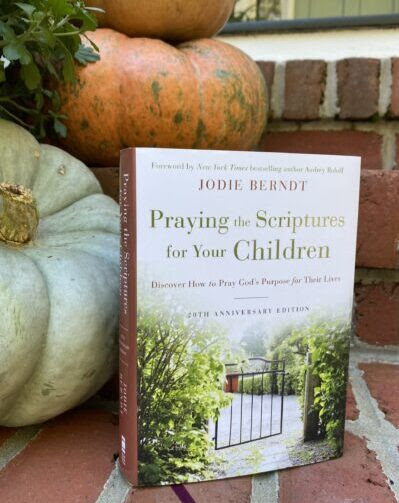




































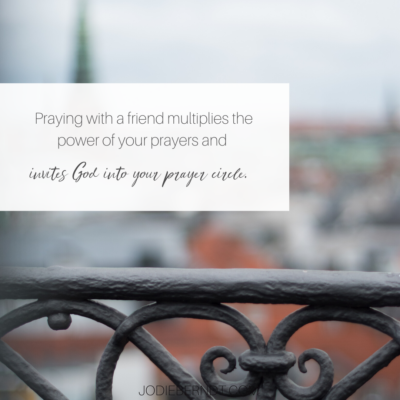


























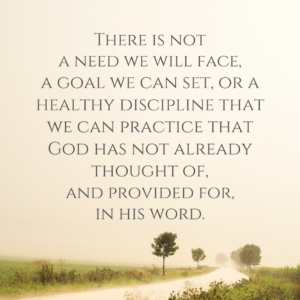
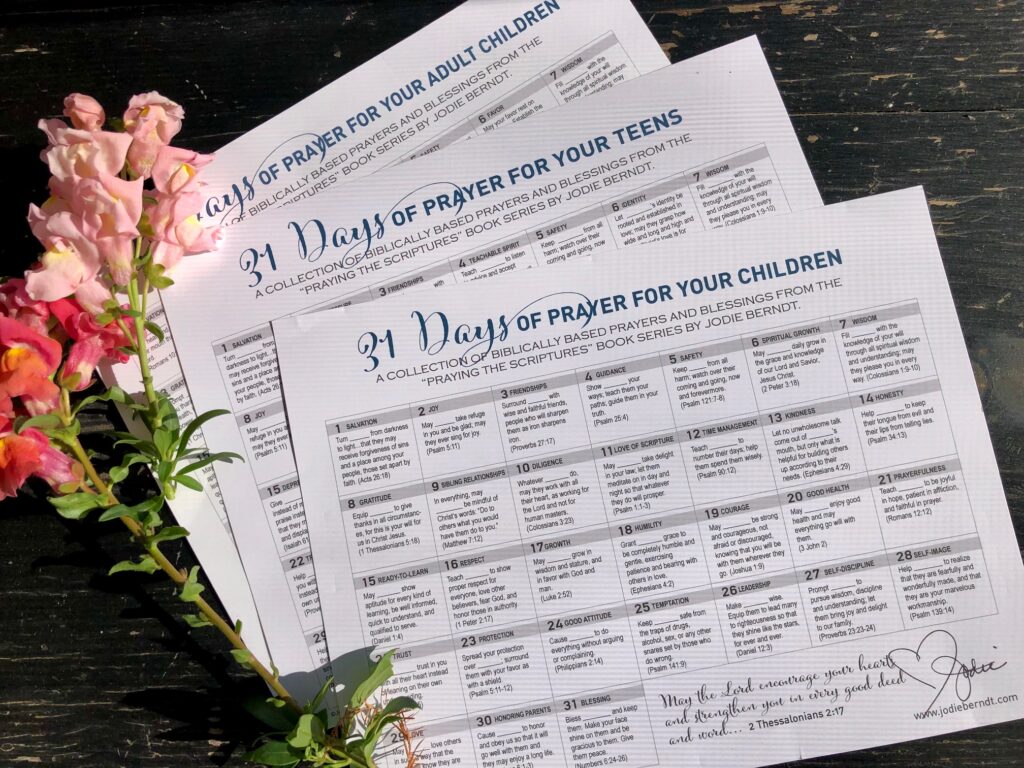













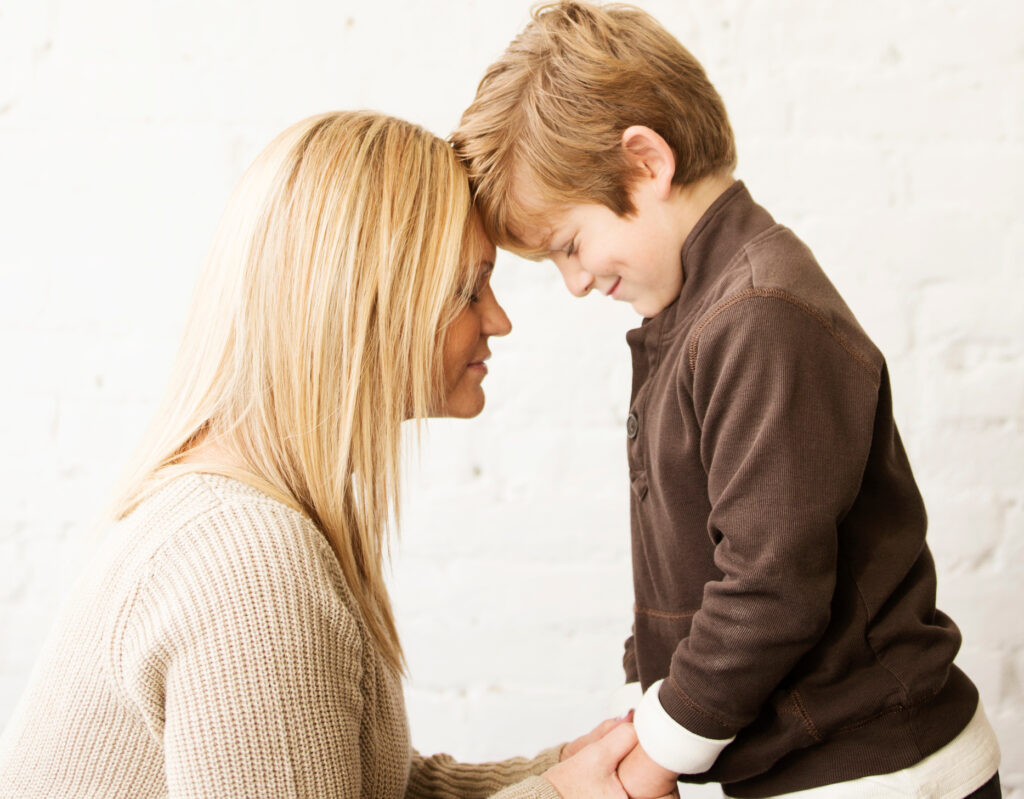
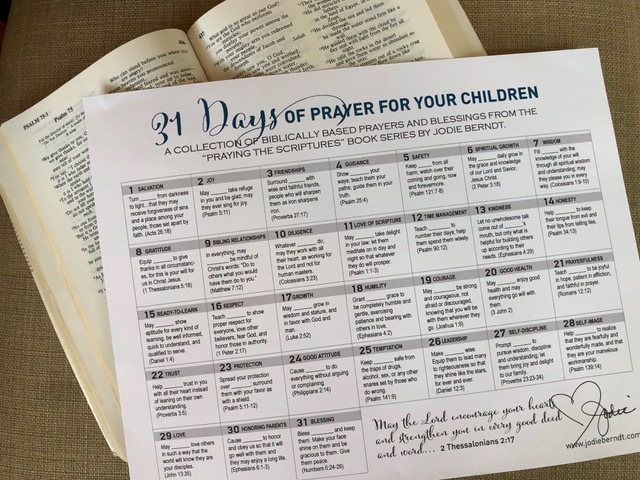
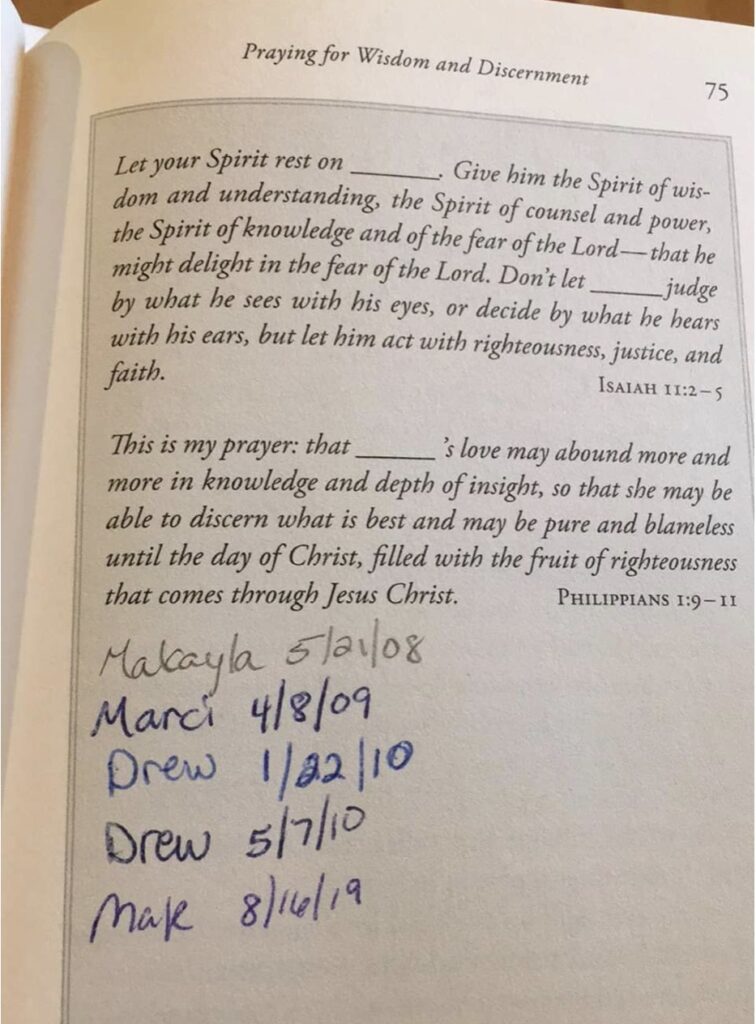
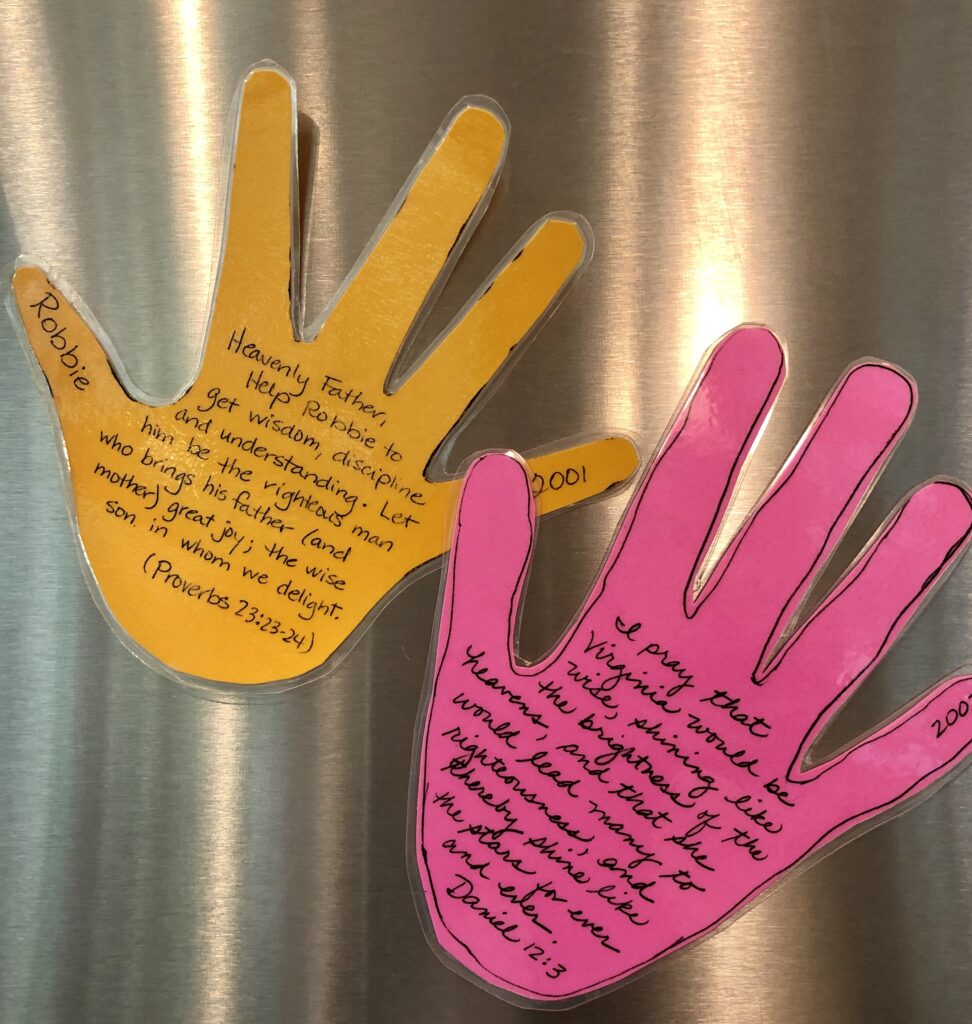
































































 The guide includes 21 prayers, all neatly divided by seven so that you can pray one every day for three weeks.
The guide includes 21 prayers, all neatly divided by seven so that you can pray one every day for three weeks.
















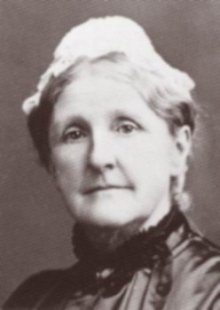



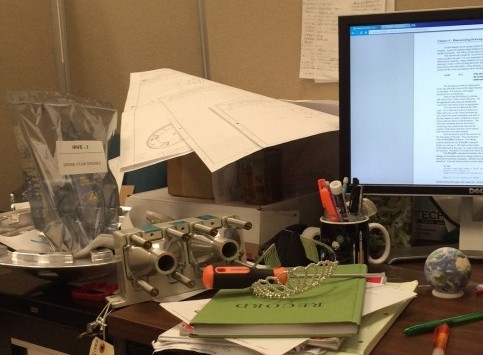

 I don’t know about you, but as the days grow shorter and the darkness comes early, I find myself longing for light. Any light. Whether it’s a fire in the fireplace, the twinkle of Christmas lights in the neighbor’s yard, or the glow of a lantern in the snow, light just makes everything better! No wonder God told us to let our light shine–and here’s a verse you can use to pray for yourself (or for someone you love) and scatter the darkness with goodness and glory!
I don’t know about you, but as the days grow shorter and the darkness comes early, I find myself longing for light. Any light. Whether it’s a fire in the fireplace, the twinkle of Christmas lights in the neighbor’s yard, or the glow of a lantern in the snow, light just makes everything better! No wonder God told us to let our light shine–and here’s a verse you can use to pray for yourself (or for someone you love) and scatter the darkness with goodness and glory!
















